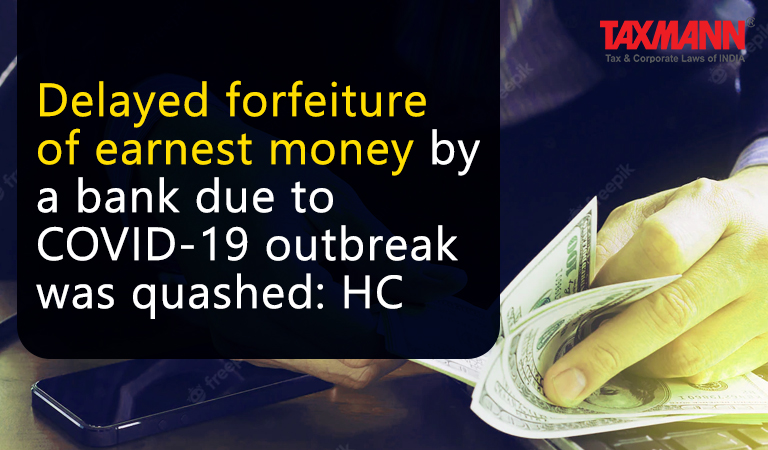Delayed forfeiture of earnest money by a bank due to COVID-19 outbreak was quashed: HC
- Blog|News|FEMA & Banking|
- 2 Min Read
- By Taxmann
- |
- Last Updated on 28 April, 2022

Case Details: Palwinder Kumar Kwatra v. Canara Bank - [2022] 137 taxmann.com 153 (Delhi)[15-02-2022]
Judiciary and Counsel Details
-
- Yashwant Varma, J.
- Alok Jagga and Chritarth Palli, Adv. for the Petitioner.
- Ms. Seema Gupta, Adv. for the Respondent.
Facts of the Case
In the instant case, Mr. Palwinder Kumar Kwatra (hereinafter referred as the “Petitioner”) filed a writ petition before the Hon’ble High Court against the Canara Bank (hereinafter referred to as the “Respondent”)
The Petitioner was the successful bidder in the auction sale of property mortgaged to the respondent-financial institution. The Petitioner deposited earnest money (10%) of the bid amount but there was a delay of 1 day in depositing the additional amount of 15 percent due to the covid outbreak.
The Respondent cancelled the sale of the mortgaged property and forfeited earnest money deposited by the petitioner due to failure on its part to pay the balance 15 % of the reserve sale price in accordance with fixed timelines.
The Petitioner filed a writ petition before the Hon’ble High Court stating that he had already deposited 10 % as earnest money and was obliged to furnish a balance 15 % of the total amount payable by the next working day (i.e. 17-3-2021) but on account of Covid-19 pandemic which broke out across country could not pay the amount timely and there was a delay of 1 day.
The respondent bank took the plea that the writ petition under Article 226 of the Constitution could not have been invoked till such time as the petitioner had availed of alternative remedy as embodied in section 17 of SARFAESI Act and the bank was right in forfeiting the deposits of the petitioner.
High Court Held
It was held that the Court had by way of the original interim order entertained the petition and directed parties to exchange pleadings. In any case, once pleadings have come to be exchanged, it would be inequitable to relegate the petitioner at this stage to pursue the alternative remedy.
The Court further held that even though the statute mandates and envisages deposits being made in accordance with provisions made in rule 9(3), Court could not shut its eyes to the unprecedented situation, which came to prevail on account of the pandemic outbreak in March 2021 and, therefore, forfeiture of earnest money deposited by petitioner was to be quashed and petitioner was directed to deposit entire balance amount as per original bid submitted and duly accepted by respondents within a period of 1 week together with simple interest thereon at the rate of 5 % to commence from 17-3-2021 and to run till deposit was ultimately made.
List of Cases Referred to
-
- Sanjay Kumar v. CBI [W.P. (C) No. 3067 of 2020, dated 8-5-2020] (para 8).
Disclaimer: The content/information published on the website is only for general information of the user and shall not be construed as legal advice. While the Taxmann has exercised reasonable efforts to ensure the veracity of information/content published, Taxmann shall be under no liability in any manner whatsoever for incorrect information, if any.

Taxmann Publications has a dedicated in-house Research & Editorial Team. This team consists of a team of Chartered Accountants, Company Secretaries, and Lawyers. This team works under the guidance and supervision of editor-in-chief Mr Rakesh Bhargava.
The Research and Editorial Team is responsible for developing reliable and accurate content for the readers. The team follows the six-sigma approach to achieve the benchmark of zero error in its publications and research platforms. The team ensures that the following publication guidelines are thoroughly followed while developing the content:
- The statutory material is obtained only from the authorized and reliable sources
- All the latest developments in the judicial and legislative fields are covered
- Prepare the analytical write-ups on current, controversial, and important issues to help the readers to understand the concept and its implications
- Every content published by Taxmann is complete, accurate and lucid
- All evidence-based statements are supported with proper reference to Section, Circular No., Notification No. or citations
- The golden rules of grammar, style and consistency are thoroughly followed
- Font and size that’s easy to read and remain consistent across all imprint and digital publications are applied



 CA | CS | CMA
CA | CS | CMA
